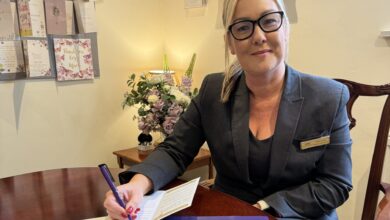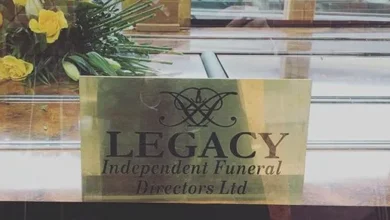Coronavirus: Advice to celebrants

Encouraging communication with clients and Funeral Directors, and ensuring financial stability and mental wellbeing, is the advice that has been issued to members of a leading Celebrants’ association as the threat of coronavirus increases.
The Association of Independent Celebrants, (AOIC) has sent an advisory note to its 200 members who, said executive chairman Philip Spicksley, faced growing personal, financial and career worries.
The AOIC, one of the sector’s fastest growing professional associations, is today sharing that information with others as it looks to support the whole profession.
These are unknown and highly uncertain times. As we face this global threat, it is up to all of us to do whatever we are able in our own spheres to help, protect and support.
As churches, public buildings and venues are now closed indefinitely, the concerns for the world’s many thousands of Celebrants are both personal and professional.
Of course, the over-riding concern is for the wellbeing of us all, but for many Celebrants there is a threat to their livelihoods too and this will understandably cause financial pressures also.
With the above in mind, the AOIC has issued the following as some essential pointers for all within the sector:
Does the insurance cover you have protect you?
In these unprecedented times, insurers are not giving much away. However, if like AOIC members, you have both professional indemnity and public liability insurance, you may already know that there is no cover for lost earnings due to sickness or cancelled bookings. Public liability provides protection against your legal liabilities to the public.
This includes property damage and bodily injury. Disease is not defined so could include legal liabilities from COVID-19 in a situation where you have breached your duty of care. For a breach of duty of care to be considered you would need to be in contravention of any government guidelines or advice regarding safety at work or travel. If you have not contravened government guidance, then there should be no grounds for a claim to be made against you.
Even if you have, your professional indemnity insurance will cover you for any claims. However, many will not have insurance to cover loss of earnings or cancelled bookings.
Bookings already made
With the Government now instructing the closure of all venues, planned wedding and other ceremonies cannot go ahead. However, if you make the decision to cancel, then in line with your contract you are most likely liable to refund your client. Different rules are being enforced at different crematoriums and other venues. Perhaps in such situations, be proactive and communicate with both the client and, where appropriate, the Funeral Director to look at alternative options. It is important for Celebrants to be clear where they stand financially if a venue or client cancels.
Complete lockdown
If the Government orders a complete ‘lockdown’, then any contract you have in effect becomes void. If you have already provided some services agreed under your contract ie written a script, you can justify receiving or keeping some of your fee. Have a look at this https://www.stanfordgouldonline.co.uk/2020/03/16/frustration-of-a-contract-astarting-point-faqs-and-some-help-for-you/
What other options do celebrants have?
Before a service is cancelled outright, ensure you communicate with the client and the Funeral Director. How about a service now that adheres with government guidelines and then an agreement that the planned event is postponed? That way, no money is refunded and there is an agreement in place. Is it possible to record a planned service or live stream – a virtual service, as is happening with Church services? Or, could the Celebrant still produce the script, for someone else to read out.
New bookings
As distressing as it is to consider, the number of deaths linked to COVID-19 is increasing and as it does so, Celebrants must think about how they can be of help and support to grieving families – our experience and knowledge of bereavement could be invaluable. Speak to Funeral Directors you have worked with, look at options for speaking to people over the phone or virtually (the first priority must be personal wellbeing so personal contact must be avoided), to offer words of comfort or the options for services to be held now, or at a later date.
Talk to each other
Funeral directors, we urge you to consider all the professional celebrants in your area at times like this – support as many of them as you can in any way possible. If your regular celebrant has to self-isolate, look at spreading that work around.
Future Planning
Have you made plans if you have to self-isolate or become ill? There will celebrants nearby who you could team up with perhaps? The AOIC is looking to do this amongst its members.
Keeping yourself and others safe:
- Avoid unnecessary physical contact;
- Hold virtual meetings;
- Agree things with your clients ahead of the booking on safe numbers and the protection of ‘at risk’ groups;
- Ensure people with symptoms or who have to self-isolate do not attend;
- Clearly ban shaking hands, keep to social distancing advice and ensure hand hygiene.
Support each other
Again, we would emphasise that these are trying times for everyone so it would be best to try and work with your clients to achieve a solution that benefits everyone in the long term. Mental wellbeing is also essential in the days and weeks ahead. AOIC members have access to a professional and confidential counselling service AOIC Support – if you are a member then use it. AOIC Griefchat is also a free online counselling service for clients of AOIC members.
Financial concerns
Talk to your bank. The government has announced a three-month mortgage break for those suffering financially as a result of coronavirus. While little has been announced for those with their own businesses and the self-employed, it is likely this will come so ensure you are fully informed. The AOIC will distribute any new information to its members.
- The UK Government’s Department for Business, Energy and Industrial Strategy has launched a dedicated business support helpline. The number is 0300 456 3565. Lines are open Monday to Friday, 9am to 6pm. You can also email enquiries@businesssupporthelpline.org
- The Scottish Government has set up a dedicated helpline. The number is 0300 303 0660. Lines are open from Monday to Friday 8.30am to 5.30pm.
- In Wales, the Business Wales Helpline is 0300 060 3000. Lines are open Monday to Friday, 8:30am to 5:30pm.
- In Northern Ireland, the Invest Northern Ireland phone number is 0800 181 4422. Lines are open Monday to Friday, 8:30am to 5pm.
- Contact HMRC if you need more time to pay your taxes. Its ‘Time To Pay’ helpline number is 0800 015 9559 and lines are open Monday to Friday, 8am to 8pm and on Saturday, 8am to 4pm.
- Talk to Jobcentre Plus about benefits for the self-employed. The Government has suspended the ‘minimum income floor’ from Universal Credit (UC) for the self-employed, so if you are in the system due to low income there is no longer an assumption you earn the equivalent of the living wage (which from next month this is £8.72 an hour, so for 35 hours a week that’s £305.20). UC is administered through Jobcentre Plus.
- If you do not currently receive Universal Credit you can apply to do so. If you need income fast, you can apply for an advance on your first scheduled payment. You can apply for Universal Credit even if you are working and it includes the self-employed whose income has dropped as a result of this disruption.
- If you are self-employed and claiming Employment Support Allowance (ESA), and test positive for coronavirus or are in self-isolation, you will be able to claim from day one of a claim instead of waiting the usual seven days.







